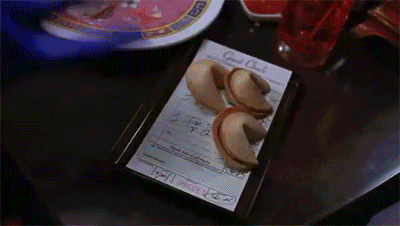American authenticity of course, that is. The origin of these little creations of sugar and flour is hotly debated, but one thing is for sure - they definitely did not originate from China. The Japanese claimed to have introduced them to the West Coast in the beginning of the 20th century, however, a businessman of Chinese descent named David Jung claims that he invented them in 1918. He claims that he originally filled these cookies with biblical quotes and passed them out to the poor and the homeless. The Japanese similarly claimed that a migrant Japanese man made these cookies and filled them with thank you notes to show gratitude. I tend to believe the businessman as these days we generally associate fortune cookies with Chinese rather than Japanese cuisine. Though originated in America, these cookies are most definitely creations of Asian immigrants, perhaps to prey on the American need for the authentic exotic.
Having grown up in China, the first time I saw fortune cookies in America Chinese restaurants I was interested and slightly amused. I half-expected the “learn Chinese” side of the fortune to be wildly inaccurate or at least, have typos and mis-translations. However, all the fortune cookies that I’ve eaten to date have had correct translations of American words into Chinese. I’m not sure why I expected this, maybe because I just expected any foreign culture to be bastardized once it has traveled to a new place. This pastry basically rose out of the need for dessert in American Chinese cuisine, probably because Chinese cuisine does not include not emphasize the concept of dessert. I actually had a very fun experience with a fortune. Several years ago I used the lucky numbers on one of these fortunes to buy a lottery ticket because you gotta live the lotto life, and the exact numbers won me $3000 dollars. I have only tried this once and I don’t think I will try it again but obviously I have no hard feelings toward these magical baked creations.
As one would imagine, the process of making fortune cookies is very simple and does not involve many ingredients. Sugar, flour, vanilla flavoring, and oil are all that’s needed to produce these. Needless to say, the nutritional value of a fortune cookie is close to the nutritional value of the piece of paper that the fortune is printed on. But one might cry “Witchcraft! How are these fortunes inside of the cookie?”. This is probably a mystery as old as the ship-in-the-bottle itself, and it has a similarly mundane answer. The bakers originally had to insert the fortunes while the cookie was still warm and then mold the cookie into its shape. This process changed forever when Edward Louie, the owner of the Lotus Fortune Cookie Company in San Francisco, invented a machine that could insert the fortune as well as fold the cookie. The machine has since been upgraded and streamlined such that the largest manufacturer today, Wonton Food Inc, churns out 4.5 million fortune cookies per day. Maybe it’s my Chinese roots speaking but I am happy that at least the fortune cookie market is controlled by Asian owned companies.
In addition to the functional role of dessert in Chinese American cuisine, I believe fortune cookies do have some social significance. For my family, at least, we like to compare our fortunes after eating a meal even though we know they are gibberish. But it provides a way to further develop relationships in a social group in terms of providing a talking point.
Sources cited:
"How Do Fortunes Get inside of Fortune Cookies?" How Do Fortunes Get inside of Fortune Cookies? (Everyday Mysteries: Fun Science Facts from the Library of Congress). N.p., n.d. Web. 26 July 2014.
<http://www.loc.gov/rr/scitech/mysteries/fortunecookie.html>
http://www.infoplease.com/spot/fortunecookies.html
<http://www.loc.gov/rr/scitech/mysteries/fortunecookie.html>
Lee, Jennifer. "The Fortune Cookie's Origin: Solving a Riddle Wrapped in a Mystery inside a Cookie." The New York Times, 6 Jan. 2008. Web. 26 July 2014.
<http://www.nytimes.com/2008/01/16/travel/16iht-fortune.9260526.html?pagewanted=all&_r=0>
"The History of the Fortune Cookie." Infoplease. Infoplease, n.d. Web. 27 July 2014.

Jiao - great post. I always wondered about "authenticity". So here's my addition... my husband always checks the numbers to see if they match bus routes in Glasgow particularly if they went near his Gran's house. I have no idea why.
ReplyDelete